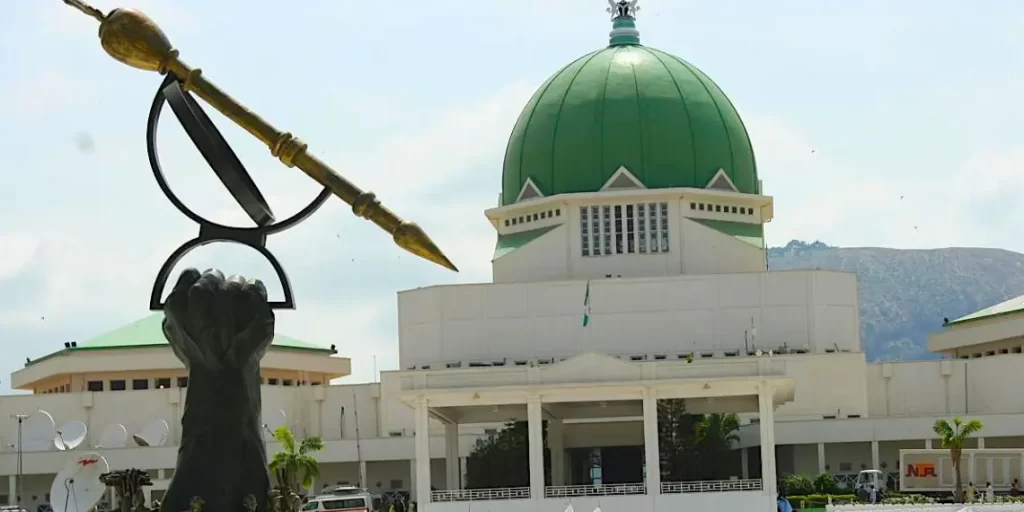N54.99tn budget for 2025: A double-edged sword for national development

National Assembly
Article written by Ade Adesokan, is a public affairs commentator
In a landmark decision that signals both ambitions and concerns, the National Assembly today approved an unprecedented ₦54.99 trillion budget for the 2025 fiscal year.
This historic budget, marking the largest in the nation’s history, presents a complex mixture of opportunities and challenges for the country.
At the heart of this budget lies a bold vision for infrastructure development, with ₦23.963 trillion earmarked for capital expenditure. This substantial allocation represents a clear commitment to addressing Nigeria’s infrastructure deficit, promising new roads, power projects and public facilities that could transform the nation’s economic landscape.
The administration’s focus on developmental projects signals a strategic pivot towards long-term growth. With improved infrastructure, Nigeria could see enhanced productivity, reduced business operational costs and increased foreign investment interest. The multiplier effects could generate thousands of jobs, particularly in the construction and services sectors the economy.
However, the budget’s ambitious scope comes with significant fiscal challenges. The ₦14.317 trillion allocated for debt servicing raises red flags about the sustainability of Nigeria’s financial trajectory. This massive debt service obligation consumes roughly 26% of the total budget, potentially constraining the government’s ability to fully deliver on its developmental promises.
The projected fiscal deficit of ₦13.08 trillion, while representing a deficit-to-GDP ratio of 1.52%, adds another layer of complexity. This shortfall will likely necessitate additional borrowing, raising questions about long-term debt sustainability and the potential impacts on future generations.
For ordinary Nigerians, the budget’s implementation could bring mixed fortunes. The increased spending on public services and infrastructure could improve living standards and create employment opportunities. The focus on capital projects could stimulate economic activity across various sectors, potentially leading to income growth and improved public services.
However, the sizeable deficit financing could fuel inflationary pressures, affecting purchasing power and living costs. The Central Bank of Nigeria will need to maintain a delicate balance between supporting growth and controlling inflation, particularly given recent currency volatility.
For most Nigerians, the approved budget represents more than just numbers – it’s about survival, dignity and quality of life. Of particular concern is how this budget will impact the most vulnerable members of society, especially the pensioners who served the nation faithfully and families struggling to make ends meet.
For pensioners who dedicated their lives to serving Nigeria, the budget’s execution carries profound implications.
Of course, the timely payment of the pensions remains a critical concern. Many retirees have faced months of delayed payments, forcing them to live in undignified conditions after years of meritorious service. The budget’s implementation must therefore prioritize regular and prompt pension disbursements.
The pensioners, who require more frequent medical attention, need assurance that their healthcare needs will be covered. The budget should strengthen the National Health Insurance Scheme to better serve the vulnerable
However, with rising inflation, pensioners’ fixed incomes are increasingly inadequate. The budget needs to account for clear regular pension reviews to maintain retirees’ purchasing power.
The budget’s impact on society’s most vulnerable members requires special attention to enhanced welfare programs for widows NOKs and single parents etc
Let take an hypothetical examples to further illustrate the figures.
For instance, in the sprawling industrial estates of Lagos, factory owners may pore over the details of Nigeria’s ₦54.99 trillion budget for 2025. In the fertile fields of Kebbi, farmers may contemplate what these figures mean for their next harvest. Across office buildings in major cities, working professionals may have to calculate how this financial blueprints may affect their monthly take-home pay.
At the heart of Lagos’s industrial area, for instance Mr. Adebayo’s textile factory hums with activity. Like many manufacturers, he eyes the budget with cautious optimism. “the allocation for power infrastructure could mean fewer hours running expensive generators,” he notes, his voice barely audible over the machinery. The manufacturing sector’s hopes hinge on several critical aspects of the budget. A promised improvements in power supply could reduce production costs, addition tax incentives could boost local production and foreign exchange policies could affect raw material costs, to mention few examples.
For manufacturers, the budget’s success will be measured in reduced operational costs, increased production capacity and improved competitiveness against imported goods.
Also in the vast agricultural belts stretching from Benue to Sokoto, farmers will see the budget through the lens of their immediate needs. Malam Ibrahim, a rice farmer in Kebbi, speaks for many: “We need better seeds, modern equipment and good roads to transport our harvest”.
In fact, the agricultural sector’s expectations include enhanced irrigation systems for year-round farming and modern storage facilities to reduce post-harvest losses. Improved access to agricultural loans would not be out of place too, including subsidized fertilizers and farming equipments.
The success of these initiatives could mean the difference between subsistence farming and commercial agriculture, potentially transforming Nigeria’s food security landscape.
In urban centers across Nigeria, the working class will watch the budget unfolding with particular interests. For civil servants like Mrs. Okafor in Enugu, the budget’s implications will touch every aspect of daily life, including potential salary reviews in response to inflation and transportation costs to and from work, healthcare and children educational expenses and housing affordability.
In fact, the working class bears the direct impact of economic policies. Their purchasing power, job security and quality of life hang in the balance of successful budget implementation.
The interconnected nature of these sectors create a complex web of economic implications.
In all, the success of this historic budget depends on its ability to:
– Create synergies between manufacturing and agriculture
– Protect working-class interests while promoting growth
– Balance industrial development with agricultural advancement
– Ensure fair distribution of economic opportunities
As sunset approaches at Mr. Adebayo’s factory, as Malam Ibrahim plans tomorrow’s farming activities and as Mrs. Okafor commutes home from work, their thoughts converge on a single hope: that this budget will translate into real improvements in their lives and livelihoods.
Moreover, as Nigeria embarks on this ambitious financial journey, the combined aspirations of manufacturers, farmers and the working class form the backbone of our national economic resilience. Their successes or struggles will ultimately write the real story of this budget’s impact on our nation’s future.
Therefore, for this budget to truly succeed, it must do more than balance books – it must balance lives, livelihoods and the collective aspirations of Nigeria’s productive forces. The next chapters of this economic story will be written not in government offices but in factories, farms, and households across the nation. It’s success will largely depend on execution.
Previous budgets have faced implementation challenges, including delayed releases, poor projects monitoring and transparency concerns. The government must strengthen its fiscal management systems and ensure transparent utilization of funds to achieve the intended impact.
Verily, the coming months will be crucial in determining whether this bold fiscal plan transforms into tangible benefits for the nation’s over 200 million citizens.
Article written by Ade Adesokan, is a public affairs commentator




